- Home
- Iris Murdoch
The Book and the Brotherhood Page 2
The Book and the Brotherhood Read online
Page 2
The waltz had ended and they were standing together in the pleasant relaxed rather limp attitude of people who have suddenly stopped dancing. Rose said, ‘I’m so glad Tamar has met such a nice boy at last.’
‘I hope she’ll grab him and hold on.’
‘I can’t see her doing anything so vigorous. He’ll have to do the grabbing.’
‘She’s so gentle,’ said Gerard, ‘so simple in the best sense, so pure in heart. I hope that boy realises what a remarkable child she is.’
‘You mean he might find her dull? She’s not a bright young thing.’
‘Oh, he couldn’t find her dull,’ said Gerard, almost indignantly. He added, ‘Poor girl, always in search of a father.’
‘You mean she might prefer an older man?’
‘I don’t mean anything so banal!’
‘Of course we’re impressed by her,’ said Rose, ‘because we know her background. And I mean rightly impressed.’
‘Yes. Out of that mess she’s come so extraordinarily intact.’
‘The illegitimate child of an illegitimate child.’
‘I hate that terminology.’
‘Well, I suppose people still think in these terms.’
Tamar’s mother Violet, never married, was the child of Gerard’s father’s deplorable younger brother Benjamin Hernshaw, also never married, who abandoned Violet’s mother. Tamar, who, it was said, only survived because Violet could not afford an abortion, was the result of an affair with a passing Scandinavian which was so brief that Violet, who claimed to have forgotten his name, was never sure whether he was Swedish, Danish or Norwegian. Upon Tamar’s waifish charm, her mousy hair and big sad grey eyes, no particular theory could be rested. Violet herself had resolutely taken the name Hernshaw and had passed it on to Tamar. Violet’s ‘messy life’, looked so askance at by Patricia, even by Gerard, had continued during Tamar’s childhood, but without any comparable accidents.
‘Violet was remarkably attractive to men,’ said Rose. ‘She still is.’
Gerard said nothing to this. He looked at his watch. He was wearing, of course, the black and white rig deplored by Gulliver Ashe, and which suited him so well.
Rose thought, I’m still jealous of any woman who comes near him, even poor little Tamar whom I’m so fond of! Sometimes she thought, I’ve wasted my life on this man, I’ve waited though I’ve known I’m waiting for nothing, he has accepted so much and given so little in return. Then she would think, how ungrateful I am, he has given me his precious love, he loves me and needs me, isn’t that enough? Even if he does think of me as a sort of ideal sister. All the same, now he’s retired from the Civil Service, he says to write things, he says to start a fresh phase of life, to perfect himself or something, he could suddenly start some mad new thing like loving women – and coming to me for advice! Then she thought, what nonsense! – and after all, haven’t I been happy?
‘How’s your father?’ she asked.
‘Not well – but not – actually dying. Of course there’s no hope, it’s just a matter of how long.’
‘I’m very sorry. Patricia didn’t think it was a crisis?’
‘No, he’s a bit worse, and we couldn’t get hold of the nurse. Pat’s very good with him, she’s an angel of patience.’
Rose had seen little of Gerard’s father in recent years, he had been living in Bristol, in the house in Clifton where Gerard had been born. Only lately, after becoming ill, he had moved to Gerard’s house in London. There was a bond between him and Rose which also made them ill at ease together. Gerard’s father had so much wanted Gerard to marry Rose. Just as Rose’s father had so much wanted Sinclair to marry Jean Kowitz. If Sinclair had survived he would have had the title. As it was it went to the Yorkshire Curtlands (second cousins, the grandfathers had been brothers), who were also to inherit Rose’s house when Rose was gone. We are all without issue, thought Rose, all those hopeful family plans frustrated, we shall disappear without trace!
‘Surely Patricia and Gideon haven’t decided to settle in that upstairs flat you made for your father?’
‘No, it’s just that their lease is up, they’re house-hunting.’
‘I hope they are! When is Gideon back from New York?’ Patricia’s husband, Gideon Fairfax, art dealer and financial wizard, now spent much time in that city.
‘Next week.’
‘You said they were trying to get you out and take over the whole house!’
‘Well, Pat keeps saying I don’t need all that space!’
The existence of the new ‘upstairs flat’ had put ideas into Rose’s head. Why should not she, and no one else, occupy that flat? Rose had for years cherished, perhaps in some dusty abandoned but persisting part of her mind still cherished, the hope that ‘in the end’, and ‘after all’, she might marry Gerard. Later this idea became more modestly that of ‘sharing a house’, of being with him, in some sense in which, for all their closeness, and their generally acknowledged closeness, she certainly was not now.
They had moved to the edge of the crowded floor, and Rose knew that in a moment Gerard would suggest that they return to ‘the room’, that is to the quarters of Professor Levquist, Gerard’s old classics tutor, which Levquist had lent to Gerard and his friends to be their base during the dance. (Levquist’s family, originally Baltic Jews called Levin, had adopted the Scandinavian suffix as protective coloration.) Rose said, to delay him, ‘Have you decided anything about the book?’ She was not referring to any book being written by Gerard, there was as yet no such thing, but to another book.
Gerard frowned at the unwelcome question. ‘No.’
The waltz music began again. Hearing the fast familiar strain they smiled and moved together. Soon Gerard was whirling Rose round and round, tightening his hold, shifting his grip, moving his left hand up her arm, then embracing her round the waist with both arms and lifting her swift feet from the floor.
A little later Rose and Gerard made their way to Levquist’s rooms just off the cloisters. Rose felt, but would not of course admit it, a little tired. They found Jenkin Riderhood in possession. Jenkin, who had clearly been drinking for some time, quickly put down the bottle of champagne. Jenkin, a little younger than Gerard, was an old friend, one of the original ‘set’ which included Sinclair, Duncan, Marcus, Robin, who had been close friends as undergraduates at the college. Of the survivors Jenkin was, or perhaps just seemed, the least successful. Duncan Cambus had been having a distinguished career, first as a diplomat, then in the Home Civil Service. Gerard had reached greater heights, tipped for the highest office in his department, when he had suddenly, quite lately, many felt unaccountably, taken an early retirement. Robin, now defected to Canada and rarely heard from, was a well-known geneticist. Sinclair had decided to be a marine biologist, and was about to visit the Scripps Oceanography Institute in California when his glider crashed. Rose had intended to go with him, Gerard was to follow, together they were going to discover America. At Oxford Gerard, Duncan and Jenkin had all done ‘Greats’, Greek and Latin, ancient history and philosophy, and had all got their ‘firsts’. Rose, who came of a Yorkshire family, with Anglo-Irish connections on her mother’s side, had studied English literature and French at Edinburgh. She had done a variety of things, never achieving anything which could be called a career, taught French at a girls’ school, worked for an Animals’ Rights organisation, been a ‘women’s journalist’, tried to write novels, returned to part-time journalism and ecology. She did unpaid social work and occasionally went to (Anglican) church. She had a small annuity from a family trust which she felt she might have been better off without; she might have tried harder. Her friend Jean Kowitz, with whom she had attended a Quaker boarding school, had been at Oxford where, through Rose, she got to know Gerard and the others, including Duncan Cambus whom she later married. Jean was a clever academic who should, Rose felt, have ‘done something’ instead of just being a wife. Jean and Duncan were childless. Jenkin Riderhood was, and had always been, a school
master. He was now senior history master in a London school. He had never applied for a headship. He was a diffident solitary man, easily pleased by small treats. He knew a number of languages and liked going on package tours. He was known to have had some romances (that seemed to be the word) with girls at Oxford, but his later sex life seemed to be non-existent, was at any rate invisible.
Jenkin said, ‘I’ve just been to look at my old rooms. There was an undergraduate there writing an essay. He called me “sir”.’
‘I’m glad he had such good manners,’ said Rose, ‘they don’t all.’
‘What’s it like out there?’
‘A forest in Ancient Egypt,’ said Gerard. ‘I hope the champers is holding out?’
‘Bags of it. Piles of sandwiches too.’
Jenkin, who was sweating and flushed with drink, brought forward a plate of cucumber sandwiches and began to mop up with a napkin some of the champagne which was swimming about on the table. He was stout, not tall, and looked fidgety and bulgy in his evening dress which was old and made for a considerably slimmer Jenkin. He had however retained his boyish look and clear soft complexion and could be better described as chubby. His faded strawy blond hair hung down about his head, still concealing a small bald patch. He had streaky blue-grey eyes, a pursed-up thoughtful often-smiling mouth and longish teeth. His face was saved from being cherubic by a rather long substantial nose which gave him an animal look, sometimes touching, sometimes shrewd.
‘I’m sorry Pat couldn’t come,’ said Gerard, pouring some champagne for Rose. Jenkin was to have been, in Gideon’s absence, Patricia’s partner.
‘Oh I’m OK,’ said Jenkin, ‘loving it. Damn! Sandwiches should bloody stay together.’ His cucumber had leapt out onto the floor.
‘Did Violet say why she couldn’t come?’ said Rose.
‘No, but one knows why. She doesn’t want to see a lot of happy laughing young people. She doesn’t want to see a lot of happy laughing us.’
‘Who is to blame her?’ murmured Jenkin.
‘She was probably glad to be asked,’ said Rose. ‘She may not have wanted to see Tamar being so happy. Parents can love their children and envy them too.’ She added, ‘We must do something about Violet.’ This was often said.
‘I didn’t spot Tamar and Conrad, did you?’ said Gerard. ‘I forgot to tell them to come up here for drinks.’
‘They won’t want to be with us!’ said Rose.
‘They look so young, the young, don’t they,’ said Gerard. ‘Ah, la jeunesse, la jeunesse! All those clear smooth transparent unspoilt unworked faces!’
‘Not like ours,’ said Jenkin, ‘scrawled over with passion and resentment and drink!’
‘You two look like children,’ said Rose, ‘at least Jenkin does. Gerard looks like –’ Wanting to avoid some ridiculous comparison she left the sentence unfinished.
‘We were children then,’ said Gerard.
‘You mean we were Marxists,’ said Jenkin. ‘Or we imagined we were Platonists or something. You still do.’
‘We thought that we could live some really civilised alternative society,’ said Gerard, ‘we had faith, we believed.’
‘Jenkin still believes,’ said Rose. ‘What do you believe in, Jenkin?’
‘The New Theology!’ said Jenkin promptly.
‘Don’t be silly!’ said Rose.
‘Don’t you mean the New Marxism,’ said Gerard, ‘isn’t it much the same thing?’
‘Well, if it’s new enough –’
‘New enough to be unrecognisable!’
‘I never go to church,’ said Jenkin,’ ‘but I want religion to go on somehow. There’s a battle front there, where religion and Marxism touch.’
‘Not yours,’said Gerard, ‘I mean not your battle. You don’t want to fight for Marx! That mix-up is totally incoherent anyway.’
‘Well, where is my battle? I’d like to be somewhere out at the edge of things. But where is the edge?’
‘You’ve been saying this sort of thing for years,’ said Gerard, ‘and here you are still.’
‘Jenkin is a romantic,’ said Rose, ‘so am I. I’d like to be a priest. Maybe it will be possible in my lifetime.’
‘Rose would make a marvellous priest!’
‘I’m against it,’ said Gerard. ‘Don’t eat all the sandwiches.’
‘You agree to being called a sort of Platonist?’ said Rose to Gerard.
‘Oh yes!’
‘That’s what you’re going to write about, now you’ve retired?’
‘You’ll write about Plotinus, like you said?’ said Jenkin.
‘Possibly.’ Gerard evidently did not want to talk about this, so the other two dropped the subject.
Rose put down her glass and went to the window. She could see the floodlit tower, the moon risen and now small, a concise circle of silver, lights in the trees by the river. Her heart heaved within her as if it were some huge thing which she had swallowed and wished to regurgitate. She suddenly wanted to sob with joy and fear. The slim pinnacled tower, in the fierce light against the dark blue sky, resembled a picture in a Book of Hours. It also reminded Rose of something, some kind of theatre, some time, perhaps many times, when she had seen illumined buildings at night and heard superhuman voices, such as the one which she now instinctively expected to hear, telling her in slow ringing tones some picturesque piece of history or legend. Son et lumière in France, England, Italy, Spain. A memory came of something in French, some unplaced piece of poetry, perhaps not even heard correctly. Les esprits aiment la nuit, qui sait plus qu’une femme donner une âme à toutes choses. That can’t be right, she thought, what a ridiculous idea anyway. Of course she did, herself, in a way, do just that, endow all sorts of silly senseless things with ‘souls’, certainly not with any exalted gesture worthy of being announced to the world by a godlike voice beside a magic tower. In her, it was more like superstition, or some sad overflow of wasted love. Breathing deeply she turned round, leaning back against the sill and smiling her faint smile.
The two men looked at her with affection, then at each other. Perhaps Gerard at any rate knew something of what she was feeling, he knew and did not know. Rose understood how little he wanted her, ever, to fail to be her calm self.
Jenkin said, ‘What about some more champagne? There’s a shocking number of bottles stashed away.’
‘Where are Jean and Duncan, I thought they might be here,’ said Rose, as the champagne cork hit the ceiling.
‘They were earlier,’ said Jenkin, ‘Jean hauled him off, she couldn’t bear not to be dancing.’
‘Jean’s such an athlete,’ said Rose. ‘She can still stand on her head. Do you remember how she stood on her head in a punt one day?’
‘Duncan wanted to stay and drink, but Jean wouldn’t let him.’
‘Duncan’s drinking too much,’ said Rose. ‘Jean’s wearing that red dress with the black lace that I like so. She has her gipsy look.
‘You look stunning, Rose,’ said Jenkin.
‘I love you in that dress,’ said Gerard, ‘it’s so intensely simple, I like that wonderful dark green, like laurel, like myrtle, like ivy.’
Rose thought, it’s time for Jenkin to ask me to dance, he doesn’t want to, he doesn’t like dancing, but he’ll have to. And Gerard will dance with Jean. Then I shall dance with Duncan. That’s all right. I feel better. Perhaps I’m a little drunk.
‘It’s time I went to see Levquist,’ said Gerard. ‘Would you like to come, Jenkin?’
‘I’ve already beer.’
‘You’ve already been?’ Gerard’s indignant tone was activated from the remote past. An old pang of indestructible timeless jealousy seared his heart with the speed of fire. It burned with an old pain. How they had all coveted that man’s praise, far away in that short golden piece of the past. They had coveted his praise and his love. Gerard had carried off the famous prize. But what he really wanted was to be praised and loved the most. It was hard to believe now that Jenkin had been h
is nearest rival.
Jenkin, who knew exactly what Gerard was thinking, began to laugh. He sat down abruptly spilling his drink.
‘Did he ask you to translate something?’ said Gerard.
‘Yes, the brute. He planted me in front of a piece of Thucydides.’
‘How did you manage?’
‘I said I couldn’t make head or tail of it.’
‘What did he say?’
‘He laughed and patted my arm.’
‘He was always soft on you.’

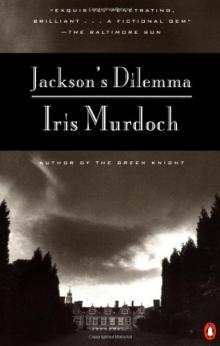 Jackson's Dilemma
Jackson's Dilemma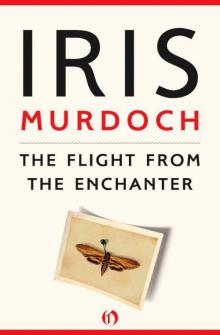 The Flight From the Enchanter
The Flight From the Enchanter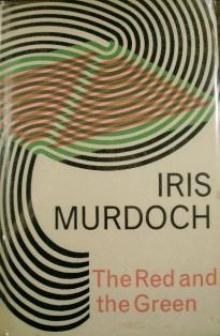 The Red and the Green (Vintage Classics)
The Red and the Green (Vintage Classics)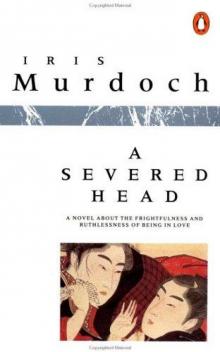 A Severed Head
A Severed Head The Black Prince
The Black Prince The Nice and the Good
The Nice and the Good The Unicorn
The Unicorn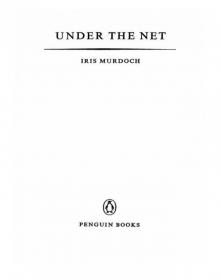 Under the Net
Under the Net The Italian Girl
The Italian Girl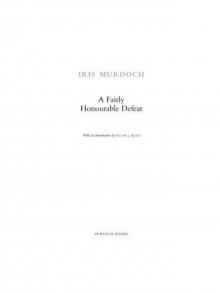 A Fairly Honourable Defeat
A Fairly Honourable Defeat An Accidental Man
An Accidental Man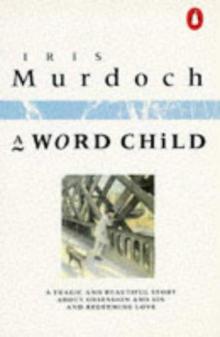 A Word Child
A Word Child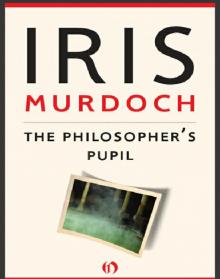 The Philosopher's Pupil
The Philosopher's Pupil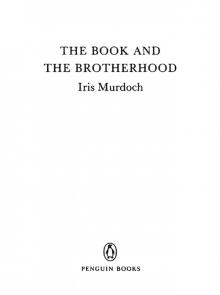 The Book and the Brotherhood
The Book and the Brotherhood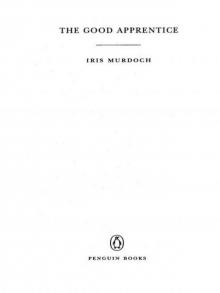 The Good Apprentice
The Good Apprentice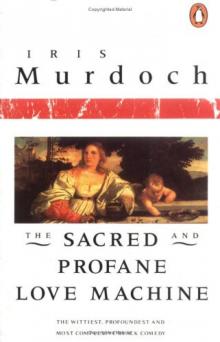 The Sacred and Profane Love Machine
The Sacred and Profane Love Machine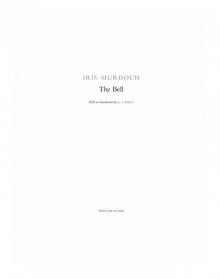 The Bell
The Bell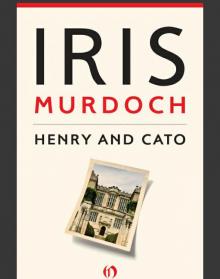 Henry and Cato
Henry and Cato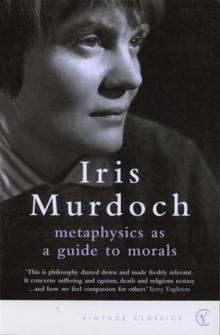 Metaphysics as a Guide to Morals
Metaphysics as a Guide to Morals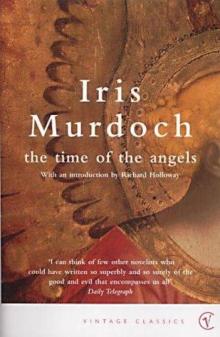 The Time of the Angels
The Time of the Angels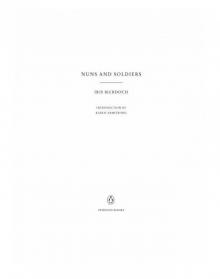 Nuns and Soldiers
Nuns and Soldiers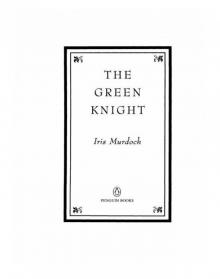 The Green Knight
The Green Knight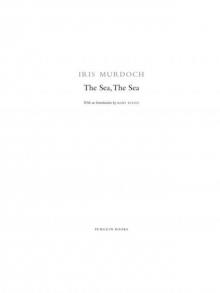 The Sea, the Sea
The Sea, the Sea Sartre: Romantic Rationalist
Sartre: Romantic Rationalist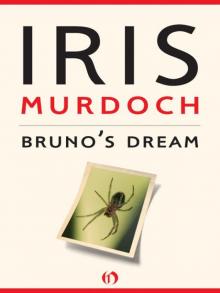 Bruno's Dream
Bruno's Dream An Unofficial rose
An Unofficial rose Sartre
Sartre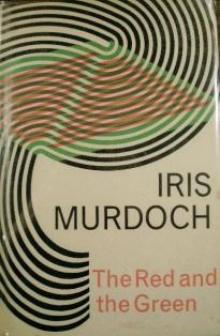 The Red and The Green
The Red and The Green